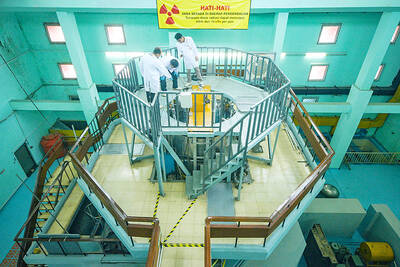The secular Nidaa Tounes party came top in Tunisia’s landmark legislative polls, beating Islamist rivals Ennahda, who had already conceded defeat, provisional results released early yesterday showed.
Nidaa Tounes won 85 of the 217 parliamentary seats in Sunday’s vote, with Ennahda coming second with 69, the ISIE election body told a press conference.
Neither of the two top parties had been expected to win an outright majority, so political horse-trading had already begun ahead of the announcement of the results.
Ennahda, dominant in Tunisian politics since the 2011 revolution, has won praise for its grace in conceding defeat in the landmark parliamentary elections in the country, which was the cradle of the Arab Spring revolts that shook the wider region.
Just hours after polling stations closed on Sunday, Ennahda acknowledged that it had been beaten into second place by Nidaa Tounes.
Ennahda, which steered the North African nation through the aftermath of the revolution, congratulated Nidaa Tounes for becoming the largest party in the first parliament to be elected since.
The movement called on its supporters to celebrate “democracy” and hundreds of them rallied outside its Tunis headquarters, despite the defeat.
“We consider Tunisia has triumphed and that Ennahda has triumphed by leading the country to this stage,” said Abdelhamid Jelassi, national coordinator for the movement, whose campaign slogan was “consensus.”
Independent analyst Selim Kharrat said it made Ennahda look like”a very sleek, very democratic party, which congratulates its opponent, which hands over power,” also referring to January, when Ennahda gave way to a government of technocrats to defuse a political crisis.
The UPL (Free Patriotic Union), led by entrepreneur Slim Riahi, came third, winning 16 seats.
That was just one more than the leftist coalition Popular Front secured.
Tunisians hope the election, and the presidential vote on Nov. 23, will provide much-coveted stability, nearly four years after the January 2011 revolution that toppled former president Zine El Abidine Ben Ali.
Nidaa Tounes, an eclectic coalition of left and center-right figures, opponents and former bigwigs of the ousted Ben Ali regime, mounted a strong campaign against Ennahda.
Tunisia’s economy has also been in the doldrums and two prominent figures were assassinated last year by suspected militants, triggering the political crisis that Ennahda resolved by handing over power.
Analyst Slaheddine Jourchi said Ennahda’s change of tack could be traced back to the Egyptian army’s ouster of former Egyptian president Mohamed Morsi in July last year and the bloody repression that followed.
“What happened in Egypt shook them up” and led to an easing of strains with Nidaa Tounes, Jourchi said.
Kharrat said this showed Ennahda’s “extraordinary pragmatism and capacity to adapt” to political developments.
Under Tunisia’s electoral system, a party that gains the largest number of votes, but falls short of an outright majority, is given a mandate to form a coalition government.
Tunisian newspapers on Wednesday predicted a grand coalition.
“The best scenario would be a Nidaa Tounes-Ennahda coalition guaranteeing a stable government for the next five years,” the French-language La Presse said.
Foreign observers praised the “free” election and signs of a peaceful transition in the birthplace of the Arab Spring.
In other countries, the hopes of the Arab Spring uprisings have given way to conflict or renewed repression.
However, poverty and unemployment, which were key factors that sparked the Ben Ali revolt, remain unresolved.

Four people jailed in the landmark Hong Kong national security trial of "47 democrats" accused of conspiracy to commit subversion were freed today after more than four years behind bars, the second group to be released in a month. Among those freed was long-time political and LGBTQ activist Jimmy Sham (岑子杰), who also led one of Hong Kong’s largest pro-democracy groups, the Civil Human Rights Front, which disbanded in 2021. "Let me spend some time with my family," Sham said after arriving at his home in the Kowloon district of Jordan. "I don’t know how to plan ahead because, to me, it feels

Poland is set to hold a presidential runoff election today between two candidates offering starkly different visions for the country’s future. The winner would succeed Polish President Andrzej Duda, a conservative who is finishing his second and final term. The outcome would determine whether Poland embraces a nationalist populist trajectory or pivots more fully toward liberal, pro-European policies. An exit poll by Ipsos would be released when polls close today at 9pm local time, with a margin of error of plus or minus 2 percentage points. Final results are expected tomorrow. Whoever wins can be expected to either help or hinder the

North Korea has detained another official over last week’s failed launch of a warship, which damaged the naval destroyer, state media reported yesterday. Pyongyang announced “a serious accident” at Wednesday last week’s launch ceremony, which crushed sections of the bottom of the new destroyer. North Korean leader Kim Jong-un called the mishap a “criminal act caused by absolute carelessness.” Ri Hyong-son, vice department director of the Munitions Industry Department of the Party Central Committee, was summoned and detained on Sunday, the Korean Central News Agency (KCNA) reported. He was “greatly responsible for the occurrence of the serious accident,” it said. Ri is the fourth person

SKEPTICAL: Given the challenges, which include waste disposal and potential domestic opposition, experts warn that the 2032 nuclear timeline is overambitious Indonesia is hoping going nuclear can help it meet soaring energy demand while taming emissions, but faces serious challenges to its goal of a first small modular reactor by 2032. Its first experiment with nuclear energy dates to February 1965, when then-Indonesian president Sukarno inaugurated a test reactor. Sixty years later, Southeast Asia’s largest economy has three research reactors, but no nuclear power plants for electricity. Abundant reserves of polluting coal have so far met the enormous archipelago’s energy needs, but “nuclear will be necessary to constrain the rise of and eventually reduce emissions,” said Philip Andrews-Speed, a senior research fellow at the